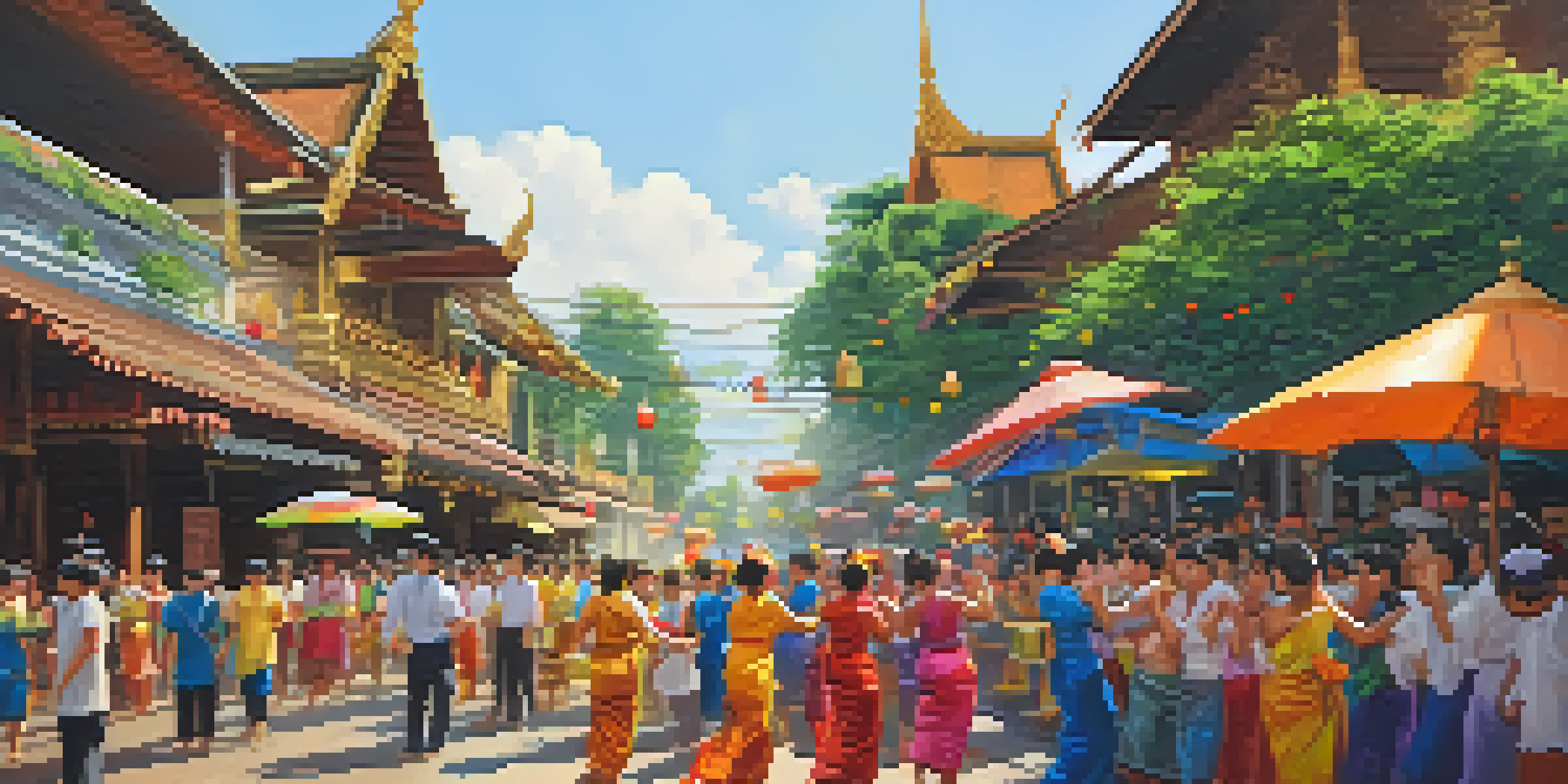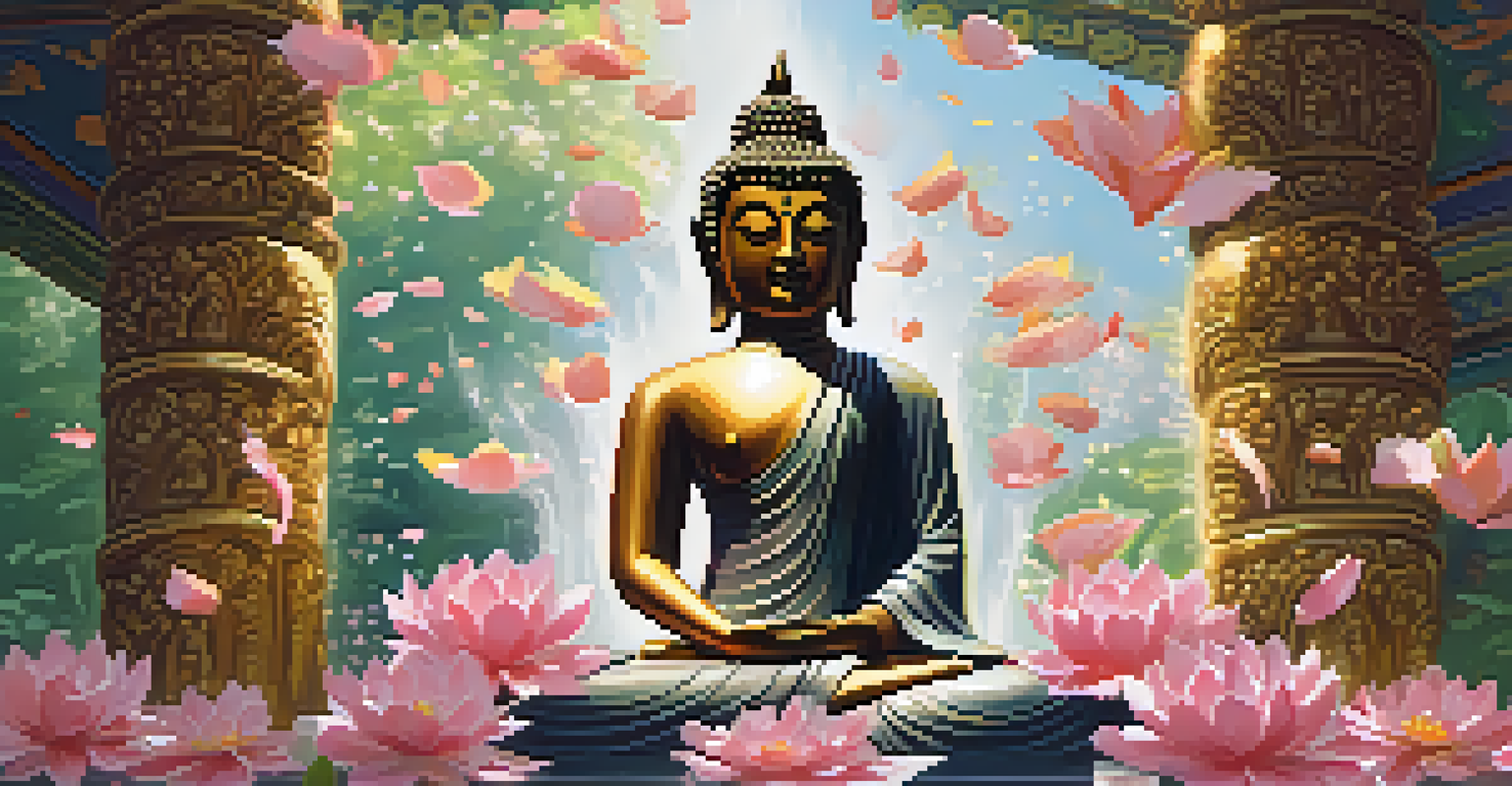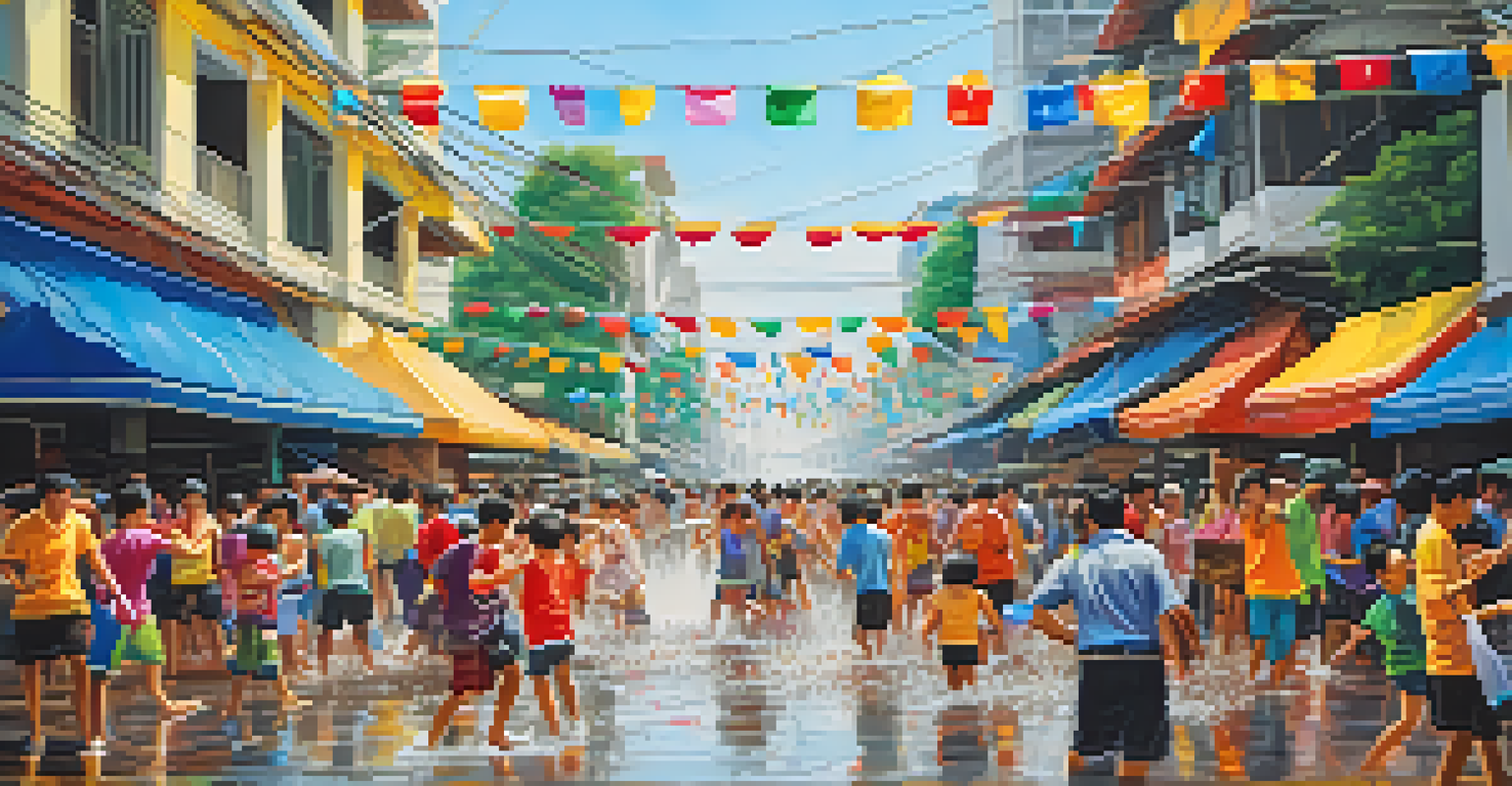The Origins of Songkran: Understanding Thai New Year Customs

What is Songkran and Why is it Celebrated?
Songkran marks the traditional Thai New Year, celebrated from April 13 to 15 each year. It's a time for families to come together, honoring their elders and participating in various cultural activities. The festival is known for its lively water fights, symbolizing the washing away of sins and bad luck, making way for a refreshing start.
Water is the driving force of all nature.
This festive occasion is deeply rooted in Buddhist beliefs and ancient traditions, reflecting the importance of water in Thai culture. Water is not just a means of celebration but is also seen as a cleansing ritual, purifying both the body and soul. The origins of Songkran can be traced back to ancient rituals, which have evolved into the vibrant celebrations we see today.
While the water fights are the most well-known aspect of Songkran, the festival also includes activities like temple visits, merit-making, and family reunions. These customs emphasize respect, gratitude, and the importance of community, highlighting the rich tapestry of Thai culture. Thus, Songkran is more than just a fun holiday; it’s a time of reflection and renewal.
Historical Roots of the Songkran Festival
The history of Songkran is intertwined with ancient agricultural practices, marking the end of the dry season and the beginning of the rainy season. This transition was crucial for farmers, symbolizing hope for a fruitful harvest. As such, the festival represents a time to express gratitude for the water and blessings received throughout the year.

The name 'Songkran' itself comes from the Sanskrit word 'Sankranti,' which means 'to pass' or 'to move into.' This reflects the movement of the sun into the zodiac sign of Aries, signifying a new cycle in the Thai lunar calendar. The blending of these astronomical elements into the celebration showcases how deeply connected Thai culture is to nature and celestial events.
Songkran Celebrates Thai New Year
Songkran marks the traditional Thai New Year, emphasizing family, cultural activities, and water rituals that symbolize purification.
Over the years, Songkran has absorbed various influences, including Hinduism and Buddhism, which have shaped its rituals and customs. The festival has transformed from a solemn religious observance into a national holiday celebrated with joy and enthusiasm. This evolution illustrates how traditions can adapt while still honoring their origins.
Key Customs and Rituals of Songkran
One of the most cherished customs during Songkran is the pouring of water over Buddha statues, known as 'Song Nam Phra.' This act is believed to bring good fortune and blessings for the coming year. Families often visit temples to engage in this ritual, reflecting their faith and respect for Buddhist teachings.
Tradition is not the worship of ashes, but the preservation of fire.
Another significant practice is the 'Rod Nam Dum Hua' ceremony, where younger family members pour fragrant water over the hands of their elders. This gesture symbolizes respect and gratitude, as well as a wish for good health and longevity. It’s a beautiful way to strengthen family bonds and honor the wisdom of older generations.
Additionally, the playful water fights that take place on the streets have become a hallmark of Songkran celebrations. People of all ages participate, using water guns, buckets, and hoses to engage in friendly battles. This fun-filled aspect of the festival not only enhances community spirit but also serves as a refreshing escape from the heat of April.
The Role of Water in Songkran Celebrations
Water plays a central role in the Songkran festival, symbolizing purification and renewal. The act of splashing or pouring water is more than just a playful activity; it carries deep spiritual significance. It’s believed that water washes away negativity and misfortune, allowing for a fresh start in the new year.
In addition to the traditional water rituals, many communities engage in symbolic ceremonies that involve the sprinkling of scented water. This water is often mixed with flower petals and herbs, enhancing its spiritual properties. The fragrant water is used to bless loved ones and places, reinforcing the notion of harmony and positivity.
Water's Symbolic Role in Customs
Water is central to Songkran celebrations, representing cleansing, renewal, and community bonding through playful water fights and spiritual rituals.
Moreover, the use of water during Songkran is also a reflection of Thailand's climate and culture. As April is one of the hottest months, the refreshing water fights provide a much-needed relief from the heat. This connection between climate and culture emphasizes how Songkran is not only a celebration of the new year but also an adaptation to the natural environment.
Modern-Day Celebrations of Songkran
In contemporary Thailand, Songkran has evolved into a nationwide festival that attracts tourists from all over the world. Major cities, particularly Bangkok and Chiang Mai, host grand celebrations filled with music, dance, and vibrant parades. These modern festivities showcase the blend of tradition and contemporary culture, making Songkran an exciting experience for both locals and visitors.
While the essence of the festival remains rooted in its traditional customs, modern celebrations often incorporate elements of entertainment and tourism. Street parties, concerts, and cultural performances add a lively atmosphere to the festivities. This evolution reflects the dynamic nature of Thai culture, which embraces change while honoring its heritage.
Despite the commercialization of Songkran, many families still prioritize the traditional aspects of the festival. Visiting temples, performing rituals, and spending quality time with loved ones remain integral parts of the celebration. This balance between tradition and modernity is what makes Songkran a unique and meaningful event.
Regional Variations of Songkran Across Thailand
While Songkran is celebrated nationwide, each region of Thailand has its own unique customs and practices. In the northern city of Chiang Mai, for example, the festival includes a vibrant parade featuring traditional music and dance. The locals often engage in a more subdued water pouring ceremony, emphasizing the spiritual aspects of the celebration.
In contrast, Bangkok is known for its lively street parties and massive water fights, attracting crowds from all over the world. The bustling city turns into a playground, where people of all ages come together to celebrate with joy and excitement. This urban celebration highlights the modern interpretation of Songkran, blending tradition with contemporary fun.
Regional Variations Enrich Tradition
Each region in Thailand brings its unique customs to Songkran, showcasing the diversity of Thai culture through various celebrations and rituals.
Southern Thailand, on the other hand, tends to focus more on religious rituals and community gatherings. In places like Phuket, locals participate in temple ceremonies and community feasts, reflecting a strong sense of cultural pride. These regional variations showcase the diversity of Thai culture and the many ways in which Songkran is celebrated across the country.
The Importance of Songkran in Thai Culture
Songkran is not just a festival; it’s a vital part of Thai identity and culture. It serves as a reminder of the values that Thai society holds dear, such as respect for elders, family ties, and community spirit. These cultural values are reinforced during the festival, creating a sense of unity among participants.
Moreover, Songkran emphasizes the importance of reflection and renewal. As people pour water over each other and engage in rituals, they are reminded of the significance of letting go of the past and embracing new beginnings. This practice of introspection aligns with Buddhist teachings, making the festival both a cultural and spiritual experience.

Finally, the festival plays a crucial role in preserving Thai heritage and traditions. By participating in Songkran, both locals and tourists gain a deeper understanding of Thai customs and values. This cultural exchange fosters appreciation and respect for the rich history of Thailand, ensuring that the essence of Songkran continues to thrive for generations to come.